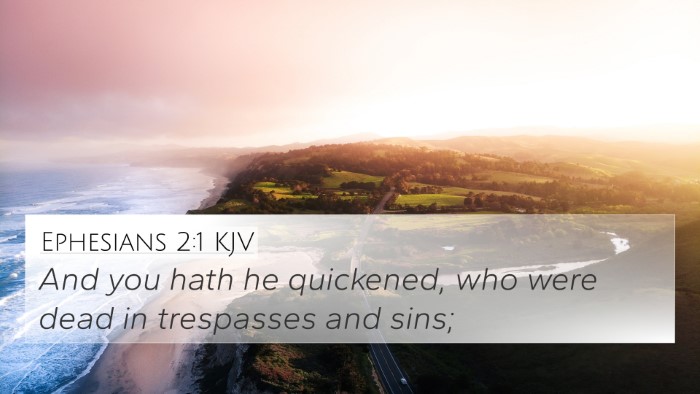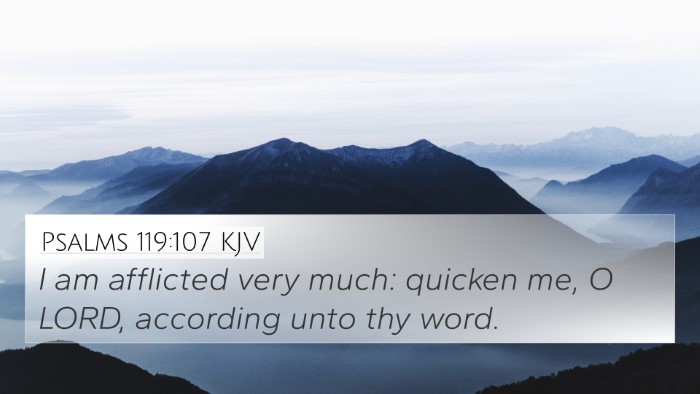Understanding Psalms 80:18
Bible Verse: Psalms 80:18
Content: "So will not we go back from thee: quicken us, and we will call upon thy name."
Summary of Meaning
This verse is a poignant proclamation of dependence on God and a desire for revival. It reflects a heartfelt commitment to remain steadfast in faith, even in times of distress. The plea for God to "quicken" or revive them signifies an acknowledgment of spiritual need, underscoring the relationship between divine assistance and human response.
Insights from Public Domain Commentaries
-
Matthew Henry:
Henry emphasizes the importance of God's reviving power. He suggests that the psalmist recognizes their vulnerability but firmly decides not to turn away from God. This commitment into calling upon God's name reflects the psalmist's understanding that their strength and hope lie solely in divine intervention.
-
Albert Barnes:
Barnes discusses the theme of restoration and the expectations of God’s people. He notes that calling upon God's name is an act of faith. The phrase, "we will call upon thy name," indicates a promise of prayer and worship that should follow a renewed experience of God's life-giving grace.
-
Adam Clarke:
Clarke provides a vivid analysis of the term "quicken," which he interprets as a revival of life and spirit. He points out that the plea made by the psalmist is not only for physical revival but also for a deep spiritual renewal that would inspire obedience and worship toward God.
Inter-Biblical Dialogue and Thematic Connections
This verse connects richly with other sentiments in Scripture, echoing themes of revival and restoration in God's people. Below is a list of related scriptures that reflect similar ideas:
- Psalm 85:6: "Will you not revive us again, that your people may rejoice in you?" - This underscores the plea for spiritual renewal.
- Isaiah 57:15: "For thus says the One who is high and lifted up, who inhabits eternity, whose name is Holy: 'I dwell in the high and holy place, and also with him who is of a contrite and lowly spirit, to revive the spirit of the lowly, and to revive the heart of the contrite.'" - This connects God's presence with revival.
- 2 Chronicles 7:14: "If my people who are called by my name humble themselves, and pray and seek my face and turn from their wicked ways, then I will hear from heaven and will forgive their sin and heal their land." - A direct relationship between seeking God and experiencing His restoration.
- John 15:5: "I am the vine; you are the branches. Whoever abides in me and I in him, he it is that bears much fruit, for apart from me you can do nothing." - A reflection on dependence on God for spiritual vitality.
- Ephesians 2:1: "And you were dead in the trespasses and sins." - The need for spiritual quickening is evident from New Testament teachings.
- Romans 12:1-2: "I appeal to you therefore, brothers, by the mercies of God, to present your bodies as a living sacrifice, holy and acceptable to God, which is your spiritual worship." - The response to God’s reviving work includes dedicated worship and obedience.
- James 4:8: "Draw near to God, and he will draw near to you..." - This encourages believers to engage actively in seeking God's presence.
Cross-Referencing Biblical Texts
Engaging in cross-referencing enhances our understanding of Scripture. The thematic connections discovered through these references can deepen our interpretation. By linking verses, we can see the broader narrative of God's faithfulness and our response to His call for revival.
Tools for Bible Cross-Referencing
- Using a Bible concordance is essential for searching specific words and their occurrences throughout the Bible.
- Employing a cross-reference Bible study guide helps connect themes between different texts effectively.
- Understanding how to leverage Bible chain references can show links between Old Testament prophecies and New Testament fulfillments.
- Utilizing comprehensive Bible cross-reference materials can greatly enhance manuscript studies and sermon preparation, making connections between scripture clear and impactful.
Concluding Thoughts
The plea in Psalms 80:18 is relevant for modern believers. It conveys a timeless message of reliance on God’s mercy and power to bring about spiritual renewal. By understanding and employing the connections between various scriptures, we create a richer and more meaningful interaction with the biblical text.
















